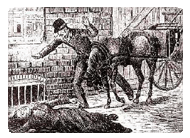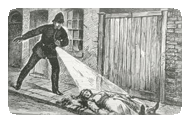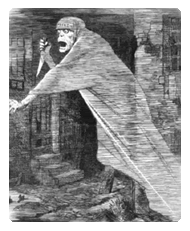Saturday, March 06, 2010
Jack the Ripper’s Secret Confession

My Secret Life is a fascinating glimpse into the patriarchal mind in the Victorian Era, as it touches on the privileges of wealth and men's attitudes toward woman, especially in sexual contexts. It is one of the most banned books in history. This website has a chronology of the people who tried to publish it over the years.
Recently, David Monaghan and Nigel Cawthorne published their book Jack the Ripper's Secret Confession, which points to "Walter," the pseudonymous author of My Secret Life, as the Ripper. To begin with, we must assume that the authors are correct in pegging Henry Spencer Ashbee, as the book never mentions the true author by name. Only then can we parse My Secret Life with the authors to deduce whether Ashbee fits the profile of Jack the Ripper. For me, this is a bit too much of a leap to take, while at the same time being one of the most original theories to date. "Walter" wrote of sexual proclivities that included violence, but he stopped short of murder (or at least does not admit to it). If he did commit the crimes and had the book published under a pseudonym, why admit what he did yet not at least allude to the rest? In the book he admits to rape and other crimes, and the book does not shy away from unpleasant topics. Those who say he would fear legal retribution are missing the fact that even now there is nothing to tie Ashbee to the book except hearsay, and he could have merely denied authorship. Records show that publishers were jailed attempting to publish the book, while the issue of the author and his confessed crimes were not really discussed. Therefore, it was more a matter of prudery and fear of such scandalous reading material readily available that drove authorities to censor the work. The book was published and quickly repressed and/or forgotten, so much so that it was only in 1932 that it resurfaces, and only then due to the publisher being arrested. Conversely, another train of thought runs that the book is most if not all fiction, so this explains the focus on the publication rather than the veracity of the content. Also, the very crimes they wish to tie Ashbee to are not mentioned in My Secret Life. If Walter/Ashbee believed he had anonymity, and time has borne this out, then why not mention, at least in passing, these seminal crimes? One possible explanation is that all the events portrayed in the memoir took place prior to August, 1888. Ashbee would have been 54 years old in 1888, which is hardly in keeping with witness descriptions of Jack the Ripper. Moreover, it seems a bit of a stretch to believe that he began killing at age 54, which would explain the absence of such events in his memoir. Conversely, the authors of Jack the Ripper's Secret Confession are intimating that a man with such fierce sexual appetites is clearly capable of the types of murders attributed to Jack the Ripper. While I believe the crimes are sexual in nature, there is a difference between the overactive libido of Walter and the terrifically repressed and violent nature of the person who killed the women in Whitechapel in 1888. Even Walter's violent tendencies and acting out of sexual fantasies involving knives seems part of his desire for new experiences and thrills. It remains a step from this to the hatred evident in the Whitechapel murders. Still, it's a fascinating addition to the canon.
I do have to give credit to David Monaghan for joining Casebook and answering questions of the people there. It shows the seriousness in which the book was written and while it may be too speculative for me, it does at least deserve a hearing.
From the publishers:
With several million copies sold in the last fifty years, My Secret Life, first published by Grove Press in the 1960s, is one of the most famous pornographic works in literary history. What readers of this long-banned and troubling book of violent sexual fantasies failed to realize is that it is also the confession of history’s most fiendish killer. Written during the era of Jack the Ripper, it’s narrated by “Walter,” the pseudonym of textile millionaire Henry Spencer Ashbee. Walter was a voyeur and rapist obsessed with prostitutes, and his writing revealed his darkest sexual secrets. He died in 1901, long before his book would be widely read. Only now have researchers finally come to the conclusion that “Walter” and Jack the Ripper were, in fact, one and the same. Jack the Ripper’s Secret Confession puts all the pieces together, and its new theory will amaze and titillate scholars who for generations have pondered the true identity of history’s most brutal murderer.
















Post a Comment
<< Home